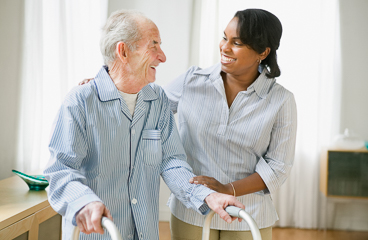
What is frailty?
Frailty is a health problem that happens to many older people. It means that a person's health is fragile. This makes it difficult for a person to heal from things like a fall, an illness, or surgery.
It can happen if you:
- Have had other health problems for a while, such as diabetes or dementia.
- Have trouble caring for yourself, have fallen, or have been in the hospital a lot.
- Have low energy or are too tired to do things.
- Are losing weight without trying.
What are the symptoms?
Symptoms include weight loss, weakness, and low energy. It may be hard to do everyday tasks, such as getting dressed, eating, and bathing. You may also have trouble using the toilet, walking up stairs, or getting out of a chair.
What happens when you have frailty?
When you are frail, it can be hard to heal from a fall, an infection, or another health problem. You can get sick very quickly. If your frailty is not treated, it usually gets worse. But with treatment your health can get better and you could become less frail.
How can you care for yourself?
If you think you are becoming frail, see your doctor. There are things you and your doctor can do to prevent frailty or slow it down.
If frailty is caused or made worse by another health problem, you and your doctor can treat the problem.
Talk to your doctor about any medicines you're taking that might be making you feel tired. Many medicines, such as cold and allergy medicines, often cause fatigue.
Eat healthy
Food gives you calories, which provide energy and can help stop weight loss. Here are some tips for eating well:
- Add high-calorie foods to your meals. Some examples are avocados, nuts, nut butters, and cheese.
- Choose foods that provide plenty of vitamins and minerals. These include fruits, vegetables, whole grains, dairy products, and protein foods.
- Try to eat meals on a regular schedule. It may help to eat smaller meals more often throughout the day.
- Ask a doctor or dietitian about liquid supplements. These drinks include Boost, Ensure, or instant breakfast drinks. Smoothies and milk shakes are other options.
- If you are having trouble getting the food you need, ask your doctor about local meal programs. Many communities have Meals on Wheels programs that can deliver food to your door. And there are often meals at places of worship and community centers that can nourish your needs for both food and social time.
Stay active
Talk to your doctor about exercises to help build your strength and balance. Examples include:
- Resistance exercises, such as pushing against a wall or sitting in a chair and raising your legs. These are an easy way to tone your muscles.
- Walking, which can be good for your body. But ask your doctor how often and how much walking is best for you.
- Tai chi, which is moving in a slow, rhythmic way. This can help with muscle tone and balance.
Prevent falls
If you are worried about falling, here are some things you can do:
- Keep your bones strong. Talk to your doctor to be sure you are getting enough vitamin D and calcium.
- Take out raised doorway thresholds, and get rid of throw rugs.
- If stairs are a problem, have handrails or a ramp installed.
- Arrange your furniture and electric cords to keep them out of walking paths.
- Keep your home well lit, especially stairways, porches, and outside walkways. Use night-lights in hallways and bathrooms.
- Use shower chairs and bath benches.
- Wear nonskid footwear, even inside. If it's icy outside, add nonslip devices to shoes.
- Talk to your doctor about your medicines. Ask if any of them increase the risk of falls and if they can be changed or stopped.
Stay connected
When you feel tired, it's often easier to stay home and not see people. But being with other people can help you feel good. And it may help you stay healthier as you age.
Where can you learn more?
Go to http://www.healthwise.net/patientEd
Enter W395 in the search box to learn more about "Learning About Frailty".
Current as of: October 25, 2024
Author: Ignite Healthwise, LLC Staff
Clinical Review Board
All Ignite Healthwise, LLC education is reviewed by a team that includes physicians, nurses, advanced practitioners, registered dieticians, and other healthcare professionals.

